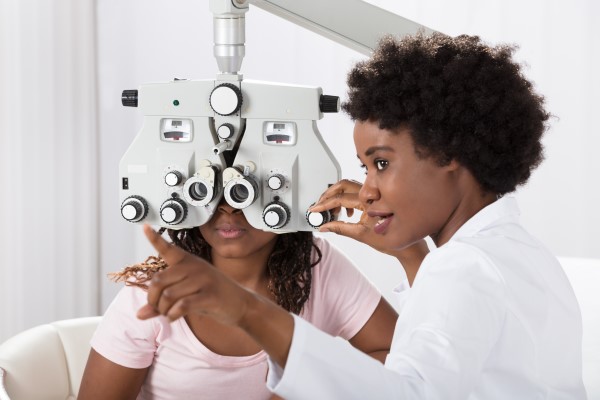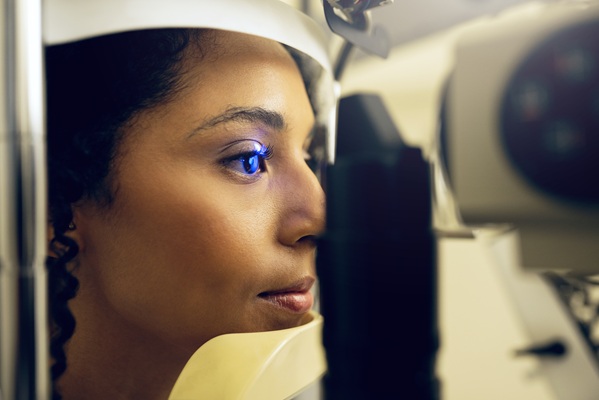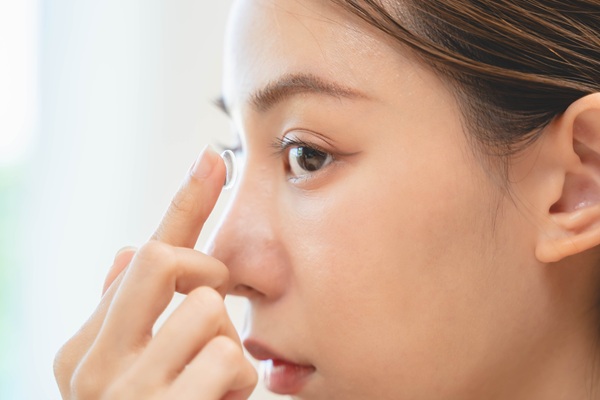At What Age Should a Child First See an Optometrist?

An optometrist should examine the eyes of a child regularly because many problems can be detected and treated early. However, many parents do not know the right time to start having their children’s eyes checked. There are many factors that have to be considered. Read on to learn when your child should see an optometrist.
Eye examination for children
Healthy eyes and good vision are a vital part of a child’s development. Any problems should be detected and treated early to ensure that babies have the chance to develop the visual abilities needed to learn and grow. Parents can help ensure that children have healthy eyes. This can be done by watching for signs of vision and eye complications and seeking eye care for a child.
When it comes to seeking eye care, it is crucial for a parent to know when a child should first see an optometrist. It is important not to delay eye exams for young children and infants. Finding a problem early can prevent a minor issue from becoming worse. Some eye problems can even end up affecting vision for life.
First eye examination
Children should undergo a comprehensive eye exam by an optometrist by age 1. The ideal time is at 6 months old. A parent should take the child to the doctor even if there are no signs of eye or vision problems. The optometrist, during the course of the eye examination, will test for eye movement ability and health problems and complications such as astigmatism, nearsightedness, and farsightedness. Although these problems are not common, it is beneficial for parents to find out if their children have them. If any complications are detected, treatment can start early, which is always a good thing.
Most babies start their lives with healthy eyes and gradually develop the visual abilities that are needed throughout life without difficulty. Eye and vision complications in infants are rare, but some problems can develop. If there are signs of eye and vision problems, an infant may need immediate attention. Even before an infant is 4 months old, sometimes seeing an optometrist is necessary.
Parents need to watch out for signs that may indicate eye and vision problems. An evaluation is required if an eye appears to regularly turn in and out. Constant eye turning may be an indicator of an issue with eye muscle control. Excessive tearing may indicate blocked tear ducts. Encrusted or red lids can be a sign of an eye infection, and light sensitivity may indicate elevated pressure in the eye. If any of these signs are noticed by parents, immediate attention may be required.
Benefits of having eye exams as a child
Good health habits include keeping regular eye exams from day one. A child must have a good experience with the optometrist during the first checkup. This can help make the next visits smooth and even fun. Here are the benefits of having eye exams early during childhood:
- It reveals serious eye ailments early. Catching serious eye diseases early can lead to early treatments. Early stages of eye disease can still be reversible. This can give the child a chance to have healthy eyesight while growing up. Letting the eye problems linger can lead to serious eye conditions.
- It improves performance in school. Regular eye checkups and treatments can help a child do better in school. An optometrist can check the child’s eyesight and see if there is a need for corrective glasses. Seeing far or near will be easier for a child with regular visits to the eye doctor.
- It keeps a child’s eyes healthy. A child does not know if one’s eyesight is already having problems. Regular eye checks can show the true health of a child’s eyes. Early treatments can help the child stay happy and healthy during the formative years.
Signs that a child needs to see an optometrist
Eye problems are immediate signs that the child needs an optometrist. Trouble seeing and light sensitivity are cries for help. Headache complaints may be the result of eye problems as well. Squinting, blinking, and rubbing the eyes more often also indicate the need for an eye checkup.
Problems participating and learning at school can become difficult for a child with eye problems. Parents may notice that the child is having difficulties in reading and writing. Participating in sports and laboratory activities may also be an issue. Maintaining focus on tasks can be difficult if the child has an eye condition as well.
Contact your optometrist
Children’s eyes should be checked by age 1. However, if there are any signs of eye-related problems, your child should visit the optometrist as soon as possible. You should not wait any longer or assume anything. The eyes should be evaluated to determine if everything is okay. If any complications are identified, treatment can start early, which may prevent problems from becoming worse. If you want to find out more about when your child should have the first eye examination, contact your optometrist.
Get more information about Texas Optical in Dallas at https://www.texasoptical.net.
Check out what others are saying about our services on Yelp: Read our Yelp reviews.
Recent Posts
For those living with diabetes, undergoing a diabetic eye exam is one of the most important steps in protecting their vision and overall eye health. High blood sugar levels can lead to a range of complications, including conditions that damage the eyes over time. These exams help detect these issues before they become serious, allowing…
Contact lenses provide clear vision and convenience for individuals who prefer an alternative to eyeglasses. However, proper care and maintenance are essential to prevent infections, irritation, and eye damage. Neglecting hygiene practices can lead to serious eye conditions, including corneal ulcers and keratitis. Understanding how to clean, store, and handle contact lenses ensures long-term eye…
Maintaining eye health and preventing long-term issues is the result of consistent and quality vision care. Many people focus on overall wellness but may overlook daily habits that support healthy eyesight. However, taking simple steps each day can protect vision, reduce eye strain, and prevent future complications. By making eye health a priority, it is…
Prescription contacts provide vision correction, comfort, and convenience for those who do not want to wear glasses. However, caring for and wearing contacts takes some getting used to. Learning to insert, remove, and maintain them will help ensure a comfortable and safe experience.Not all contact lenses are the same, and choosing the right pair is…


